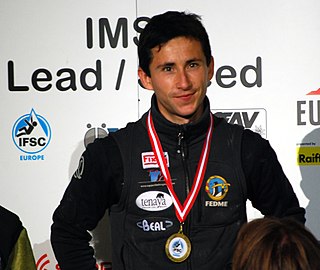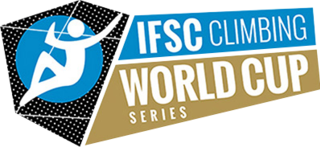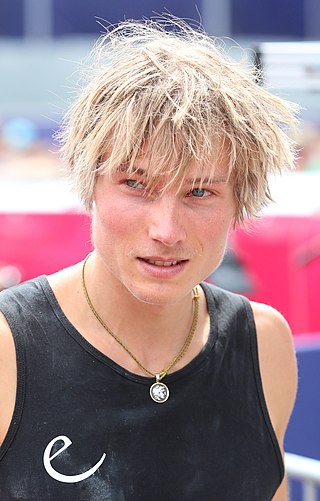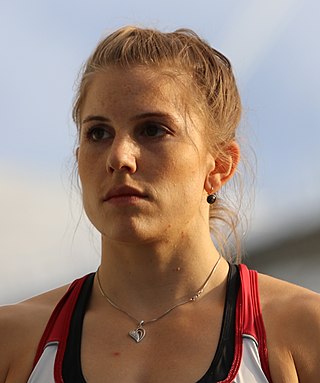
Many climbing routes have a grade that reflects the technical difficulty—and in some cases the risks and commitment level—of the route. The first ascensionist can suggest a grade, but it will be amended to reflect the consensus view of subsequent ascents. While many countries with a strong tradition of climbing developed grading systems, a small number of grading systems have become internationally dominant for each type of climbing, which has contributed to the standardization of grades worldwide. Over the years, grades have consistently risen in all forms of climbing, helped by improvements in climbing technique and equipment.

Ramón Julián Puigblanque is a professional Spanish rock climber specializing in competition lead climbing and sport climbing. He won two World Championships, in 2007 and 2011, three European Championships, in 2004 2010 and 2015, and one Lead Climbing World Cup in 2010. From 2001 to 2016, he participated in 16 seasons of the World Cup, winning 21 World Cup stages. He has also redpointed several sport routes above 9a (5.14d), and made the first free ascent of La Rambla.
Tomáš Mrázek is a professional Czech rock climber specializing in lead climbing competitions. He won two World Championships, in 2003 and 2005, and one Lead World Cup, in 2004.

Competition climbing is a form of regulated rock climbing competition held indoors on purpose-built artificial climbing walls. The three competition climbing disciplines are lead climbing, bouldering, and speed climbing. The result of multiple disciplines can be used in a "combined" format to determine an all-round winner. Competition climbing is sometimes called "sport climbing", which is the name given to pre-bolted lead climbing.

In the history of rock climbing, the three main sub-disciplines – bouldering, single-pitch climbing, and big wall climbing – can trace their origins to late 19th-century Europe. Bouldering started in Fontainebleau, and was advanced by Pierre Allain in the 1930s, and John Gill in the 1950s. Big wall climbing started in the Dolomites, and was spread across the Alps in the 1930s by climbers such as Emilio Comici and Riccardo Cassin, and in the 1950s by Walter Bonatti, before reaching Yosemite where it was led in the 1950s to 1970s by climbers such as Royal Robbins. Single-pitch climbing started pre-1900 in both the Lake District and in Saxony, and by the late-1970s had spread widely with climbers such as Ron Fawcett (Britain), Bernd Arnold (Germany), Patrick Berhault (France), Ron Kauk and John Bachar (USA).
The IFSC Climbing World Championships are the biennial world championship event for competition climbing that is organized by the International Federation of Sport Climbing (IFSC). This event determines the male and female world champions in the three disciplines of competition climbing: competition lead climbing, competition bouldering, and competition speed climbing. Since 2012, a combined ranking is also determined, for climbers competing in all disciplines, and additional medals are awarded based on that ranking. The first event was organized in Frankfurt in 1991.
The IFSC Climbing European Championships are the biennial European championship for competition climbing organized by the International Federation of Sport Climbing (IFSC). The first competition was held in Frankfurt in 1992.

The IFSC Climbing World Cup is a series of competition climbing events held during the year at various locations around the world, organized by the International Federation of Sport Climbing (IFSC). At each event, the athletes compete in three disciplines: lead, bouldering, and speed. The number of events varies from year to year, and the winners for each discipline are decided by the points accumulated in the year.

Alexander Megos is a German rock climber specializing in sport climbing, bouldering and competition climbing. In 2013, he became the first-ever climber to onsight a 9a (5.14d) graded route. He has made the first free ascent (FFA) of some of the hardest sport climbing routes in the world, including two 9b+ (5.15c) routes, three 9b (5.15b) routes, and several boulders with a boulder 8C (V15) rating.

Muriel Sarkany is a Belgian professional rock climber who specialized in competition lead climbing where she is known for winning five Climbing World Cups. She also specialized in outdoor sport climbing and is considered the fourth-ever female climber in history to redpoint a 9a (5.14d)-graded route, which was PuntX, in Gorges du Loup, in FRA.
The IFSC Climbing World Youth Championships are the annual World Youth Championships for competition climbing organized by the International Federation of Sport Climbing (IFSC). The first competition was held in Basel, Switzerland in 1992. Bouldering was introduced at the 2015 championships.

Petra Klingler is a Swiss rock climber who specializes in competition climbing. Known as a versatile climber, she competes in a wide range of competitive events, including competition bouldering, competition speed climbing, competition lead climbing, and also competition ice climbing.
The 2021 IFSC Climbing World Cup was the 33rd edition of the international sport climbing competition series, held in seven locations. There are 11 events: four bouldering, five lead, and two speed events. The season began on 16 April in Meiringen, Switzerland with the first bouldering competition in the season, and concluded on 4 September in Kranj, Slovenia. The International Federation of Sport Climbing had initially scheduled 18 events concluding on 31 October, but COVID-19 travel restrictions resulted in the cancellation of events in Xiamen and Wujiang in China, Jakarta in Indonesia and Seoul in South Korea.
The 2005 UIAA Climbing World Championships, the 8th edition, were held in Munich, Germany from 1 to 5 July 2005. It was organized by the Union Internationale des Associations d'Alpinisme (UIAA). The championships consisted of lead, speed, and bouldering events.
The 2001 UIAA Climbing World Championships, the 6th edition, were held in Winterthur, Switzerland from 5 to 8 September 2001. It was organized by the Union Internationale des Associations d'Alpinisme (UIAA). The championships consisted of lead, speed, and bouldering events. Bouldering was added as a new event.
The 1999 UIAA Climbing World Championships, the 5th edition, were held in Birmingham, United Kingdom from 2 to 3 December 1999. It was organized by the Union Internationale des Associations d'Alpinisme (UIAA). The championships consisted of lead and speed events.
The 1997 UIAA Climbing World Championships, the 4th edition, were held in Paris, France, from 31 January to 1 February 1997. It was organized by the Union Internationale des Associations d'Alpinisme (UIAA). The championships consisted of lead and speed events.
The 1995 UIAA Climbing World Championships, the 3rd edition, were held in Geneva, Switzerland from 5 to 6 May 1995. It was organized by the Union Internationale des Associations d'Alpinisme (UIAA). The championships consisted of lead and speed events.
The 1991 UIAA Climbing World Championships, the first edition, were held in Frankfurt, Germany from 1 to 2 October 1991. It was organized by the Union Internationale des Associations d'Alpinisme (UIAA). The championships consisted of lead and speed events.
Competition speed climbing in the 2019 IFSC Climbing World Cup was held over six stages at six different locations, from 12 April to 20 October 2019. The top three in each competition received medals, and at the end of the season, the overall winners were awarded trophies. The overall winners were determined based upon points, which athletes were awarded for finishing in the top 30 of each individual event. Bassa Mawem won the men's seasonal title, YiLing Song won the women's seasonal title, and Russian Federation defended its national team title.







